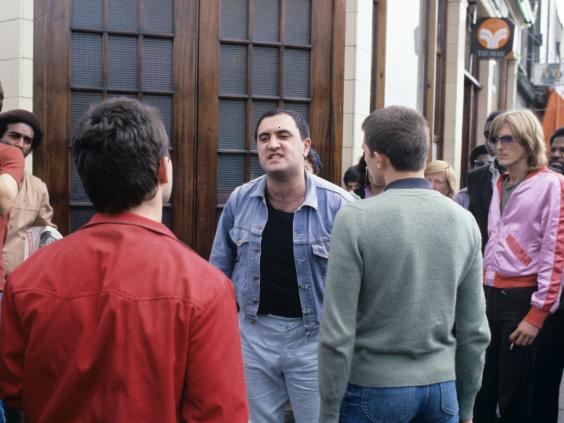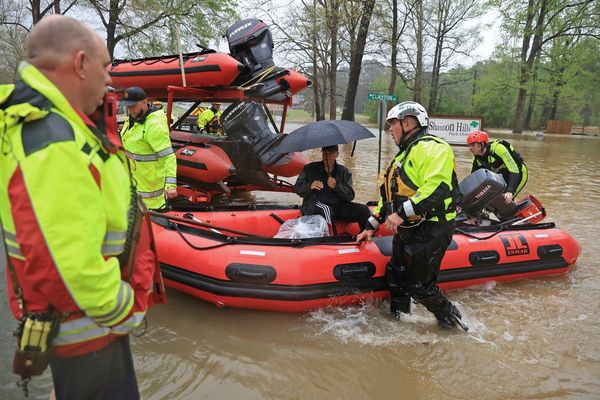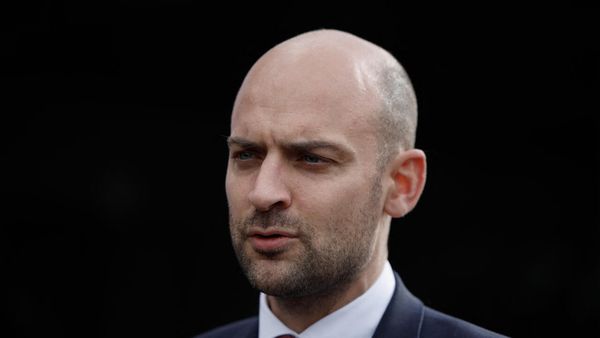
On Saturday 29 May 1979, a crowd of comedy fans converged on a new nightclub in London's Soho. To get in, they had to negotiate a side entrance in the hookers' alley of Meard Street, take the lift four floors up to an evil-smelling topless bar called the Gargoyle Club, before descending a steel-and-brass staircase – allegedly designed by Matisse – to the faded glamour of the tiny Nell Gwynne Theatre. There, a hundred chairs were arranged, cabaret-style, around tables facing a glittery curtain and a spotlight that illuminated a single microphone on its stand.
What were they expecting? A succession of laughter merchants, such as the funnymen who'd been appearing on Granada TV's gag-a-minute The Comedians through the 1970s? Frank Carson, Bernard Manning, Jim Bowen, Charlie Williams, Tom O'Connor, people like that? Or perhaps a Mike Yarwood-style impersonator, doing their version of Frank Spencer? Whatever they expected of the comic talent, nothing prepared them for the MC.
Alexei Sayle erupted on to the tiny stage like a foul-mouthed volcano, a fuming, unstoppable lava of vituperation, raining white-hot contempt on the audience's complacency, hypocrisy, political shallowness and moral bankruptcy. It was a stunning attack. Word spread about the Comedy Store: about the quality of the stand-up acts who took their chance at the microphone (Paul Merton, Sandi Toksvig and Clive Anderson were early successes) and the fate of the hapless inadequates who were gonged-off if they incurred the crowd's disapproval; but mostly word spread about the force of nature in leather jacket and chinos that was Sayle.
Even the London Review of Books, a publication that seldom condescended to follow modern trends in humour, came to check him out. "Sayle's posture is manically contemptuous," wrote Ian Hamilton, "his rhythm a hysterical crescendo of obscenity with spat-out satirical asides. Both the stance and the timing are near-perfect, and within seconds he has the audience agape. Most of them, it seemed, had never been called cunts before."
Sitting in the bar of the Hotel Russell, bald, bright-eyed and prodigiously bearded like a veteran muzhik on the Bolkonskys' country estate in War and Peace, Alexei Sayle reflects on the big day. He remembers few details, beyond the yelling and swearing and sweating. "I don't remember a thing beyond shouting at the audience, who were in raptures. Everybody was drunk, it was completely wild. It felt like I'd passed into another country." What had he been thinking as he stood there? "I was thinking: 'I'm fucking brilliant, I am extraordinary, to be able to do this, and control this crowd on this night; there's nobody in the country who could've done what I've done, nobody in the world.'"
You look at Sayle for signs of self-deprecation. His memoir of life in his twenties and early thirties, Thatcher Stole My Trousers, is full of self-accusation, pratfalls, memories of idiocy and delusion, all built up for comic effect. But about his debut he is deadly serious: he knows he helped change the tone of British comedy. He blazed a trail for a new generation of punkish comic violence (such as The Young Ones) and politically engaged stand-up, that consigned to oblivion the old gag-> merchants; he effectively silenced the humour of mothers-in-law, tits, arses, Pakis, micks and poofs.
He describes his success with the Comedy Store halfway through the book. The early part charts his struggle to find a role in life after leaving his native Liverpool for London in September 1971. He is very funny about his parents, his father a railwayman, his mother a Lithuanian Jewish lollipop lady, both hard-line Marxists who used to take the young Alexei to demonstrations and Trades Union conferences in seaside resorts.
How committed a Marxist had he been? "I was in the Young Communist League for a bit when I was 16, and then became a Maoist, but that was like, youthful rebellion. I never really liked it." That would have been in 1968. Was he inspired by the student riots in Paris that year? "No, I didn't really understand them – they seemed unserious, dilettante-ish."
Really? He knew the word "dilettante" at 16? "Oh yes. And 'bourgeois' and 'dialectic'." He's been reading David Aaronovitch's book Party Animals, about the journalist's communist parents. "So much about his experience was identical to mine. Even some of the people were the same. My parents had a [Communist] Party dentist. They fell out with him and found a non-communist one – and discovered you could get an injection before a filling." He laughs huskily. "What ruined Aaronovitch was that he believed it all, and was angry at his parents' betrayal of what he believed in. But from an early age I stopped believing. Instead I chose to stand on the sidelines laughing at everyone. Hence my subsequent career."
Sayle came to London in 1971 to study painting at Chelsea School of Art. How had he fetched up in such a temple of bourgeois culture? Had his parents arranged it? "My parents?" he asks, incredulously. "How would anyone in Anfield know what Chelsea Art School was like? It was all my doing. I used to come down to London, on my free rail pass. My friend Glen Cocker had a mate at the Royal Academy, and we went to Chelsea to see David Hockney give a talk. And I thought, 'I'll go here'. It was pure arrogance. I knew it was the No 1 school, so I wanted to go there."
It was a shock to meet the rich for the first time – and to find that the staff encouraged rebellion. "They very nearly threw me out; but then I made this little film [about a magician performing inept tricks to a rapturous and adoring crowd] which they loved because they thought I was taking the piss out of them. It made me fond of them and want to kill them at the same time."
When not meeting members of the Communist Party of Great Britain (Marxist-Leninist), whose HQ was a bookshop in Tufnell Park, Sayle spent his twenties in short-lived jobs: factory floor sweeper, civil servant, school dinner lady – and drug dealer. Discussing this involves the author in much wrestling with his conscience. It becomes one of the book's main themes. He sells drugs, but does so at a financial loss to himself so that was OK. "I never had any qualms about it," he says calmly. "It was only a bit of weed, a couple of tabs of acid, some Red Lebanese. I worried about putting it in the book, but I think it's a funny story, deciding which part of Marxist dialectic I was transgressing. It was really about identity – putting on a mask. I was interested in pretending to be a drug dealer."
He's high-minded about not signing on the dole when out of work, although the welfare state is a central tenet of socialism. Later he disparages subsidised comedy or drama, and insists it should survive only with money from paying customers (very Thatcherite free market). He's even squeamish about working for both the BBC and Channel 4 simultaneously.
Where did such fastidiousness come from? "I think my parents imbued in me the idea of morality, of what was acceptable or not. It was central to the discourse in our house. Every day they'd talk about someone being a sell-out, someone who used to be in the party and was now a Tory. Or they'd say the news was all lies, perpetuated by the capitalist system. These were ordinary teatime conversations. As for signing on, it went against my moral code. One thing the party always emphasised to its members was that, if you were a trades unionist, you had to be a good worker, you couldn't be a skiver." He pauses as a thought strikes him. "My dad was a good railwayman. He would never skive."
Sayle's book charts his comic influences: his first sighting, on screen, of Richard Pryor in full rant, for instance, and his delight in Monty Python sketches. "One had Eric Idle doing a long monologue about tourists, all Torremolinos and Watneys Red Barrel. I thought, 'Fucking hell, that's great, I'll have some of that.' > And the idea of using philosophical references in sketches – that was a very Liverpool thing. You'd find old geezers in Merseyside pubs talking about Descartes. It's a town of autodidacts."
He has no time, predictably, for the older school of British comedians. When he appeared on television in OTT and other comedy shows, he met several veteran drolls in TV canteens. "They struck me as terribly sad. They'd been bright, working-class kids who'd fallen into this terrible sadness. Like Frank Carson – he'd had an interesting life, he'd been in the Paras, served in Palestine after the war, and all he did was tell fucking gags. It must make you crazy, doing gags all the time. Bernard Manning or one of the others would say, 'I'm not feeling too well this morning,' and you'd say, 'Oh I'm sorry to hear it,' and it would turn into a fucking gag. I thought: 'What's wrong with you people?' Morecambe & Wise, you could see there was some heart in their material. But the old-school cunts, I felt sorry for them. They seemed tortured, like Arthur Miller characters."
Some of the new-wave comedians don't escape a slap from Sayle. His stories about Keith Allen, a Comedy Store stalwart, reek of exasperation at his manic behaviour: his penchant for onstage nakedness, his habit of throwing darts (not paper ones – real ones) at audience members, his love of smashing things. "He was very much an antic spirit, like a Lord of Misrule," says Sayle. "He took crazy physical risks, like riding on the roof of a train. But I found him very inspirational. He made me up my game enormously. We had a very ambiguous relationship because we were ploughing the same field. What Keith couldn't do was bang it out every night. I always could, no matter how out of control I seemed to get."
Michael McIntyre, who certainly can bang it out night after night, gets short shrift. "What do I think of him? His audience are people who don't know anything about comedy and don't have much sense of humour. Which is a lot of people. But he's done his time. He's busted his hump for years. He's served his apprenticeship. It doesn't work for me, but…"
A writer called Dennis Berson makes an incisive comment about Sayle in the book. "It was Dennis who first summed up my contribution to comedy by saying I was the first comic he'd ever seen who didn't want the audience to like them. I wanted to make them laugh but I didn't want to do it by gaining their sympathy or trust." Sayle spends much of the book reporting how much people didn't like him and how he stayed aloof from celebrity, endlessly buoyed up by his 42-year relationship with his wife, Linda. Towards the end, with the success of The Young Ones, we find him happily ensconced every night in the fashionable Zanzibar in Covent Garden, hanging out with Dawn French and Jennifer Saunders, Rik Mayall and Lise Mayer, Adrian Edmondson, Peter Richardson, Nigel Planer and their partners.
Did that show the chronic lone-wolf rebel becoming an establishment luvvie at last? He muses on this, lying back in the armchair, fingers playing fussily with his nose, as if trying to stop it growing like Pinocchio's.
"I don't think everything I did was ideologically pure. I'd never present myself as somebody who never gave in to temptation. But I didn't join in everything. After doing The Secret Policeman's Ball, I refused to be in Live Aid or Comic Relief, and it affected my career quite badly.
"I'd stand by these decisions. I had a stand-up routine, where I said Comic Relief had been invented by the poor of the Third Wo.rld to help struggling comedians. After Live Aid, they talked about how it revived the career of Queen, or how great David Bowie was. Nobody really gave a fuck about the cause. I was always uncomfortable that the performers were getting more out of it than whoever was supposed to be benefiting from it."
As a man who has embraced, rejected, satirised and re-embraced left-wing politics throughout his life, what does Sayle make of the rise of Jeremy Corbyn? "I'm very excited by Jeremy's rise," he says without enormous conviction. "Although you can see all the forces of evil and their lies being deployed against him. People say he's brought 1970s-style socialism back, but those left-wingers were dicks. I was never very keen on Tony Benn, a pompous, self-important man. And Derek Hatton and Eric Heffer – awful, vile people.
"Jeremy is nothing like them. He's ascetic and morally incorruptible. The propaganda that's thrown against him is disgraceful. Until he appeared, you had to vote for one kind of Oxbridge twat or another, people who all go to the same dinner parties, people like the Ed Ballses and George Osbornes. Jeremy has shown that, within a democratic tradition, other things are possible."
Splendid. But can he see Corbyn becoming prime minister? "Yeaaaah," says Sayle, reluctance drawing out the word like chewing gum, "but with difficulty. But yeah, why not? Anything's possible."
In the meantime, he's contemplating a third volume of memoirs, "if this book does well". What'll it be called? The first was called Stalin Ate My Homework. This is Thatcher Stole My Trousers…"It'll have to be Blair Something'd My Something." What's the working title? "I'm thinking of Blair Blackened My Cod, so I can write about that cuisine that suddenly appeared in 2000. Would that work? Blair Blackened My Monkfish?"
Alexei Sayle's 'Thatcher Stole My Trousers' is published on 10 March by Bloomsbury, price £16.99










